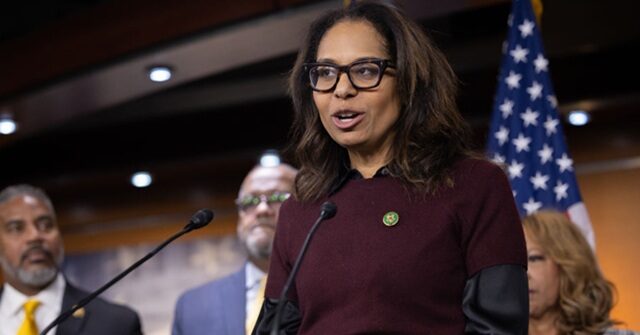During a recent episode of NewsNation’s “The Hill,” Representative Sydney Kamlager-Dove (D-CA) expressed strong skepticism regarding the Department of Government Efficiency, which she regards as a superficial initiative aimed at slashing essential programs for Americans. Kamlager-Dove emphasized her unwillingness to engage with this department—a sentiment she reinforced by labeling it as a “fake position for fake people.” Her concerns are primarily centered on the potential impact of program cuts on vulnerable populations, notably the elderly who depend on Social Security and Medicare for their livelihoods. The congresswoman articulated her commitment to advocating for American citizens and making government operations more equitable and effective for everyone.
During the dialogue, the host, Blake Burman, inquired whether she seeks to be part of the discussions surrounding DOGE, the department in question. Kamlager-Dove’s response was unequivocal; she rejected the idea, reiterating her belief that engagement with DOGE would implicitly support an agenda that risks the well-being of American citizens. She underscored her objection to negotiations that threaten essential services, calling it unacceptable to allow jeopardy to fall upon “grandmothers across the country” simply due to arbitrary fiscal conservatism. This highlights her commitment to protecting the interests of the populace against what she perceives as politically motivated budget cuts.
The conversation took a more detailed turn when Burman countered Kamlager-Dove’s objections by asserting that DOGE was not pursuing cuts to Social Security. However, Kamlager-Dove stood her ground, noting that the overarching aim of some legislatures appears to be targeting a $2 trillion reduction in spending. As she pointed out, with Congress controlling a budget of approximately $1.7 trillion, significant reductions could indeed impact crucial mandatory programs necessary for the survival of many Americans. She indicated her support for identifying and addressing wastefulness within government spending; however, she voiced her reluctance to compromise on essential services that uphold the quality of life for citizens.
In response to further questioning about her stance on participating in negotiations with DOGE, Kamlager-Dove elaborated on her perspective regarding the realities of legislative collaboration. She acknowledged the necessity to engage with Republicans, given their narrow majority, to ensure constructive dialogue about government functionality. The congresswoman’s comments reflect a pragmatic approach, understanding that while some legislative aspects are contentious, cooperation might be essential for protecting programs that serve the public good.
In venturing into the perceived motivations behind the creation of the Department of Government Efficiency, Kamlager-Dove questioned the underlying intent, particularly referencing high-profile individuals like Elon Musk. She remarked on his substantial financial gains—in excess of $6 billion through taxpayer funding—raising doubts about the authenticity of the proposed efficiency measures. Her concerns speak to a broader critique of how wealthy stakeholders may exploit government initiatives for personal or business gains at the potential expense of ordinary citizens reliant on federal programs. Kamlager-Dove’s commentary alludes to a need for greater transparency and accountability in governmental operations.
Ultimately, Kamlager-Dove’s remarks illustrate a deep-seated commitment to prioritizing the needs of the American public over abstract fiscal strategies that could harm essential services. While acknowledging the importance of efficiency and prudent management of taxpayer dollars, she insists that these goals should not come at the cost of the well-being of individuals depending on programs like Social Security and Medicare. Her determination to engage constructively while firmly advocating for the needs of her constituents embodies a crucial crossroads in the ongoing discussion about government efficiency and public welfare.

